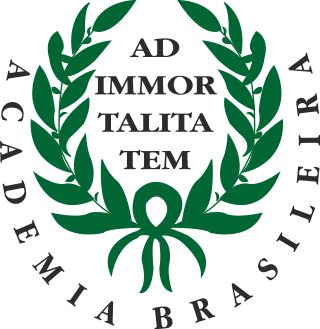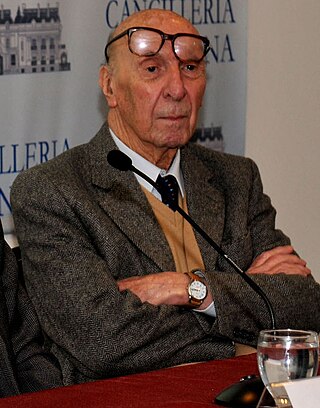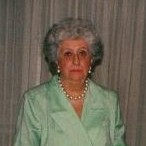
João Cabral de Melo Neto was a Brazilian poet and diplomat, and one of the most influential writers in late Brazilian modernism. He was awarded the 1990 Camões Prize and the 1992 Neustadt International Prize for Literature, the only Brazilian poet to receive such award to date. He was considered until his death a perennial competitor for the Nobel Prize in Literature.

Brazilian literature is the literature written in the Portuguese language by Brazilians or in Brazil, including works written prior to the country's independence in 1822. Throughout its early years, literature from Brazil followed the literary trends of Portugal, gradually shifting to a different and authentic writing style in the course of the 19th and 20th centuries, in the search for truly Brazilian themes and use of Brazilian forms.

The Academia Brasileira de Letras is a Brazilian literary non-profit society established at the end of the 19th century. The first president, Machado de Assis, declared its foundation on Tuesday, 15 December 1896, with the by-laws being passed on Thursday, 28 January 1897. On Tuesday, 20 July of the same year, the academy started its operation.

Manuel Carneiro de Sousa Bandeira Filho was a Brazilian poet, literary critic, and translator, who wrote over 20 books of poetry and prose.

Luis Ángel Caffarelli is an Argentine-American mathematician. He studies partial differential equations and their applications. Caffarelli is a professor of mathematics at the University of Texas at Austin, and the winner of the 2023 Abel Prize.

Ricardo Piglia was an Argentine author, critic, and scholar best known for introducing hard-boiled fiction to the Argentine public.

Clorindo Manuel José Testa was an Italian-Argentine architect and artist.
Rafael Fernando Squirru was an Argentine poet, lecturer, art critic and essayist.

Ricardo Ernesto Montes i Bradley, poet, essayist, art historian, and literary critic and diplomat born on June 9, 1905, in Rosario, Argentina. He was Honorary Consul of México in Rosario, professor of Fine Arts, publisher, columnist and contributor in newspapers and literary magazines in Latin America. R-E Montes i Bradley held Doctorates in the Law, Diplomacy, History and International Law. He was an active member of the International Institute of Ibero-American Literature and the International Association of Critics; Correspondent Member of the National Academy of Arts and Literature of Cuba and of the National Academy of History and Geography of Mexico; Honorary Member of the Mexican Academy of Genealogy and Heraldry ; member of the Sociedad Argentina de Escritores (SADE); a member of the Círculo de la Prensa and the Colegio de Abogados de la Ciudad de Rosario; co-founded the Escuela de Bellas Artes de Rosario; member of the Asociación de Críticos de México. As publisher, he was responsible for the Boletín de Cultura Intelectual, which he also directed; the art magazines Revista Paraná and Cuadernos del Litoral were also the result of his commitment to journalism in the arts. The last two publications were dedicated to promote the works of local artist, writers, poets in the region known as Paraná, Rosario de Santa Fe and vicinity.
María Esther Vázquez was an Argentine writer and journalist, best known as a collaborator and biographer of Jorge Luis Borges and Victoria Ocampo.

Ernesto Hernández Busto is a Cuban writer living in Barcelona (Spain).

Miguel Gerónimo de Esparza (1678–1767) was a Spanish nobleman, who served during the Viceroyalty of Peru as Attorney and Regidor of Buenos Aires. He also served as Captain of the Militias and acting Mayor of Buenos Aires for several periods.
Margarida Cabral de Melo (1570–1631) was a Portuguese noblewoman related to the discoverer of Brazil Pedro Álvares Cabral. In 1599 she settled with her husband and children in Buenos Aires. She was one of the most distinguished women in the Río de la Plata, in the early 17th century, owned of luxury homes, farms and vineyards.

Manuel Cabral de Melo e Alpoim (1589–1676) was a Portuguese nobleman in the service of the Spanish Empire. He was one of the most prominent military and politicians of the Río de la Plata towards the beginning of the 17th century.
Tamara Kamenszain was an Argentine poet and essayist.

María Hortensia Lacau was an Argentine pedagogue, writer, essayist, poet, and teacher. Dedicated to teaching and pedagogy, she was a teacher at the secondary, tertiary and university levels. She taught at Colegio Nacional de Buenos Aires and Escuela Superior de Comercio Carlos Pellegrini among other institutions. Lacau gave the chaired "Commentary on Texts" in the entrance courses of the Faculty of Philosophy and Letters of the University of Buenos Aires. She is the co-author of the "Lacau-Rosetti" Spanish Manuals with which several generations of Argentines studied Spanish and literature. She was a recipient of the Konex Award and the Illustrious Citizen of Buenos Aires award.
Lila Guerrero was a Jewish poet, translator, essayist, playwright and literary critic famous for translating numerous Russian and Soviet modern poetry into Spanish.












